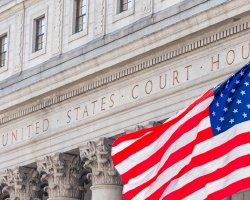New Developments in the Sackler Case Suggest More Needs to be Done to Hold Pharma Magnates Accountable

Purdue Pharmaceuticals, and the Sackler family that owns it, have been engaged in a legal battle with almost half of America for several years. Purdue manufactured and aggressively marketed OxyContin, starting in 1996 and throughout the early 2000s. With intense enthusiasm, the company heavily pushed OxyContin to medical practitioners across the United States. Purdue even went so far as to give doctors cushy bonuses and special treatment if they prescribed the highly addictive opioid medication.
OxyContin isn’t promoted as heavily as it once was. But its destruction rages on through the opioid epidemic it helped to create.
Since the early 2000s, millions of Americans fell prey to OxyContin addiction, and tens of thousands died from overdoses as a result. Furthermore, soaring addiction rates to OxyContin and other opioid pain relievers resulted in a resurgence of heroin addiction - if an addict couldn’t get OxyContin, heroin would do. This scenario set the stage for introducing fentanyl into the group of widely available, addictive opioid drugs.
Despite all that destruction, the Sackler family, owners of Purdue Pharmaceuticals, is on the verge of escaping accountability for their role in creating the opioid epidemic.

The Story
Following an avalanche of lawsuits from two dozen state attorney generals and dozens of county prosecutors, Purdue Pharmaceuticals filed for Chapter 11 bankruptcy protection. Since its filing in 2019, the legal battle has been prominent and is closely watched by many. The potential ramifications of this case are far-reaching – the outcome of this battle could potentially set a precedent for pharma companies being held accountable for contributing to America’s fatal opioid epidemic.
“The bankruptcy system should not be allowed to shield non-bankrupt billionaires...”
From the beginning, the case has been fraught with controversy. Several legal scholars have suggested that bankruptcy protections were never intended to protect individual billionaires and that bankruptcy court is not the place to resolve a grievance involving the deaths of tens of thousands of Americans. “The bankruptcy system should not be allowed to shield non-bankrupt billionaires,” said Massachusetts Attorney General Maura Healey. And from Adam Levitin, who teaches law at Georgetown University, “The most socially important chapter 11 case in history will be determined through a process that does not comport with basic notions of due process. These cases have been overshadowed by a single, critical question: who is responsible for [Purdue Pharma’s] confessed crimes and the harm they caused?”
To Professor Levitin’s point, Purdue Pharma, the corporation, has pled guilty on multiple instances. In fact, Purdue Pharma has pled guilty to federal felony crimes relating to its OxyContin marketing schemes on at least three occasions. Purdue Pharma employees aggressively pursued doctors and pressured them to prescribe OxyContin in the highest quantities possible to patients.
Yet the Sackler family, the owners of Purdue Pharma (and many of whom sit on the company’s board of directors), deny any responsibility or wrongdoing. If the court upholds the Sackler family’s bid for bankruptcy, it will halt the more than 400 civil cases filed against members of the Sackler.

To summarize it all in one sentence, the crux of this issue and the core of its controversy is that the Sackler family, a multi-billionaire family and one of the wealthiest in America, is hiding behind a bankruptcy case for protection without being in bankruptcy themselves.
Several states pursuing legal action against the Sacklers are beginning to drop their efforts because the bankruptcy settlement would free up billions of dollars from Purdue Pharma’s holdings and the Sackler’s fortunes. The freed-up money would go to state and local efforts to address the opioid epidemic.
However, while 15 states have more or less agreed to the bankruptcy settlement, nine states are still holding out and insisting that the Sackler’s be held accountable for their crimes. Unfortunately, all signs indicate the bankruptcy mediation will go forward. Quoting one report, “The settlement plan, which is now all but certain to be finalized next month, would shelter members of the Sackler family, who own Purdue Pharma, and many of their associates from future opioid lawsuits.” Not only does the impending agreement shield the Sackler’s from current accountability, but it also protects them from future lawsuits regarding their role in harming Americans with OxyContin.
The nine states that are still holding out and refusing to grant the Sacklers a free pass are Connecticut, California, Delaware, Maryland, New Hampshire, Oregon, Rhode Island, Vermont and Washington. The states that have agreed to the deal are Colorado, Hawaii, Idaho, Illinois, Iowa, Maine, Minnesota, Nevada, New Jersey, North Carolina, Pennsylvania, Virginia and Wisconsin.
A Silver Lining
One of the changes during the mediation process in June and July that caused several states to agree to the bankruptcy deal was that the Sacklers agreed to release private company documents concerning the company’s role in creating, pushing and aggressively distributing OxyContin.
The revised deal includes key language that inspired holdout states like Massachusetts and New York to agree to the bankruptcy, a “material expansion,” as it were, of the public document repository already created under the settlement plan. The documents would provide some transparency about Purdue Pharma’s role in what would become America’s worst opioid addiction epidemic on record. Again quoting Massachusetts Attorney General Maura Healey, “While I know this resolution does not bring back loved ones or undo the evil of what the Sacklers did, forcing them to turn over their secrets by providing all the documents, forcing them to repay billions will help stop anything like this from ever happening again.”
“Despite a lack of increased efficacy in treating pain compared to older medications, Purdue mounted an aggressive marketing campaign that included a warning from the FDA in 2003 over misleading advertisements…”

Legal scholars are not the only ones aware of the harm caused by OxyContin, Purdue and the Sacker family. Doctors also realize the truth surrounding this issue, and they’re speaking out about it. Quoting Dr. Ronald Hirsch’s letter in the medical journal Missouri Medicine, “First up is Purdue Pharmaceuticals, the manufacturer of Oxycontin. Oxycontin was approved by the Food and Drug Administration (FDA) in December, 1995. Despite a lack of increased efficacy in treating pain compared to older medications, Purdue mounted an aggressive marketing campaign that included a warning from the FDA in 2003 over misleading advertisements. Physicians, including myself, believed Purdue and started using Oxycontin, thinking we were helping patients.” If more doctors see the truth in the Purdue/Sackler lies, it’s likely doctors will be warier should another drug company try to convince them to mass-prescribe a questionable drug.
A Broad Consensus of Where the Blame Lies
The fact that the Sacklers and Purdue Pharmaceuticals are partially responsible for the opioid epidemic is not just this writer’s opinion or conjecture. The very federal institutions that monitor, study, research and attempt to address America’s addiction problems have recognized that pharma companies like Purdue (and their owners) were at Ground Zero of the addiction crisis. Quoting the National Institute on Drug Abuse, “In the late 1990s, pharmaceutical companies reassured the medical community that patients would not become addicted to prescription opioid pain relievers, and healthcare providers began to prescribe them at greater rates. This subsequently led to widespread diversion and misuse of these medications. Opioid overdose rates began to increase. In 2017, more than 47,000 Americans died as a result of an opioid overdose. That same year, an estimated 1.7 million people in the United States suffered from substance use disorders related to prescription opioid pain relievers.”
Most American people sense that the Sacklers are in the wrong. The federal institutions responsible for studying and addressing the addiction epidemic are aware of the Sacklers’ and Purdue Pharma’s role in fueling the opioid epidemic. But unfortunately, the Sacklers seem to be able to wield their immense wealth to buy their way out of criminal liability or even an admission of wrongdoing. This is a gross injustice. While it’s true that funding is desperately needed to repair the damage caused by the Sacklers, a wealthy family should not be able to buy their way out of accountability.
Save Lives, Seek Treatment
Just as important as it is to hold those who created the opioid epidemic accountable, we must help those currently addicted to drugs as soon as possible. Addicts should not wait for legal settlements with Purdue Pharma before seeking treatment. Addicts should get help now. Waiting another day may result in an overdose death.
If you know someone who is addicted to drugs, help them get into a treatment center. Don't wait another day, as another day may be too late.
Sources:
- https://www.npr.org/2021/06/02/1002085031/sackler-family-empire-poised-to-win-immunity-from-opioid-lawsuits
- https://www.npr.org/2021/07/08/1014043094/fifteen-states-drop-opposition-to-controversial-purdue-pharma-oxycontin-bankrupt
- https://www.ncbi.nlm.nih.gov/pmc/articles/PMC6140023/
- https://www.drugabuse.gov/drug-topics/opioids/opioid-overdose-crisis


 ®
®